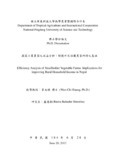Please use this identifier to cite or link to this item:
http://archive.nnl.gov.np:8080/handle/123456789/71| Title: | Efficiency analysis of smallholder vegetable farms: implications for improving rural household income in Nepal |
| Authors: | Shrestha, Rudra Bahadur |
| Keywords: | Vegetable farm Smallholder farmer Household income Poverty reduction -- Nepal |
| Issue Date: | 20-Feb-2018 |
| Abstract: | Poverty and hunger reduction are intertwined challenges and enduring issues in the world, particularly in developing countries and more pronounce in Nepal. Improvement in the efficiency in vegetable farming helps farmers increase per capita income, reduce poverty and eventually improve the livelihood of smallholder farmers.This study evaluates the efficiency of vegetable farms in Nepal using parametric stochastic frontier analysis (SFA) and non-parametric data envelopment analysis (DEA) approaches. The results reveal that there is a wide range and great extents of inefficiencies in vegetable farms. The inefficiencies (economic, technical, allocative, and scale) are higher in winter than in summer season implies that there is a considerable potential to improve efficiency in vegetable production in winter season. Because of the inefficiencies in vegetable farms, the farmers lost levels of outputs and profits is about 25 %. In addition, the farmers could have much higher levels of potential costs reduction (about 60 %), and such cost reduction comes by adopting the best technology practices of the efficient farms through the optimal resource allocation. The farms operate at the frontier levels could recover these levels of outputs and profit losses, and reduce the excessive use of input costs that improve the household income of vegetable farmers. The inefficiencies mainly caused by seed types (not using the improved varieties), ineffective training and extension services, inadequate support services (market, credit, and infrastructures), and gender discrepancy in vegetable farming. This study suggests that vegetable farms have substantial potential for improving vegetable production efficiency with greater access to improved seeds, agricultural credit, education levels of farmers, and extension services. This study recommends to adopt improved vegetable farming technologies, infrastructures development associated with vegetable farming, and support servicesfor farmers in general and women farmers in particular, to increase farm efficiency. While some of these support services are currently available, this study suggests that more focus be given to creating improved market access, to women focused extension, and to training packages for sustainable and substantial increase in production efficiency. These support services can lead to increase farm income, improve household economy, and eventually reduce poverty of smallholder farmers in Nepal. |
| Description: | Dissertation submitted to Department of Tropical Agriculture and International Cooperation National Pingtung University of Science and Technology, 2015. |
| URI: | http://103.69.125.248:8080/xmlui/handle/123456789/71 |
| Appears in Collections: | 300 Social sciences |
Files in This Item:
| File | Description | Size | Format | |
|---|---|---|---|---|
| Dissertation -Rudra B. Shrestha.pdf | 2.39 MB | Adobe PDF |  View/Open |
Items in DSpace are protected by copyright, with all rights reserved, unless otherwise indicated.